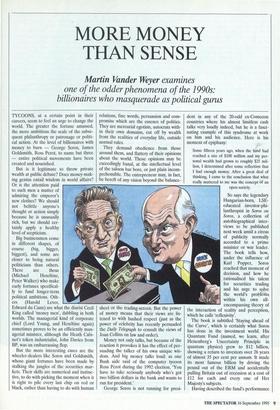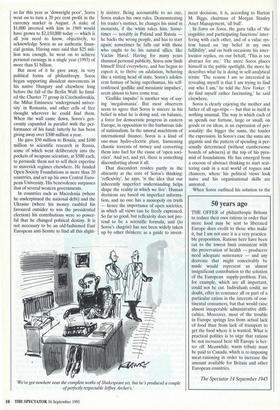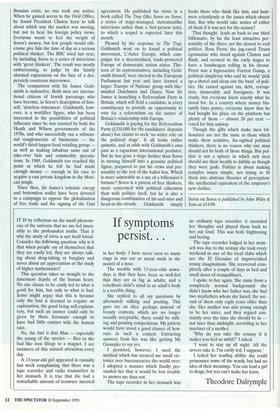MORE MONEY THAN SENSE
Martin Vander Weyer examines
one of the odder phenomena of the 1990s: billionaires who masquerade as political gurus
TYCOONS, at a certain point in their careers, seem to feel an urge to change the world. The greater the fortune amassed, the more ambitious the scale of the subse- quent philanthropy or patronage or politi- cal action. At the level of billionaires with money to burn — George Soros, James Goldsmith, Ross Perot, to name but three — entire political movements have been created and nourished.
Big businessmen come in different shapes, of course (big, bigger, biggest), and some arc closer to being natural politicians than others.
There are those (Michael Heseltine, Peter Walker) who make early fortunes specifical- ly to fund longer-term political ambitions. Oth- ers (Harold Lever, Edward du Cann) are what the diarist Cecil King called 'money men', dabbling in both worlds. The managerial kind of corporate chief (Lord Young, and Heseltine again) sometimes proves to be an efficiently man- agerial minister, although the Heath Cabi- net's token industrialist, John Davies from BP, was an embarrassing flop.
But the more interesting cases are the wheeler-dealers like Soros and Goldsmith, whose giant fortunes have been made by stalking the jungles of the securities mar- kets. Their skills are numerical and instinc- tive, to do with picking the moment when it is right to pile every last chip on red or black, rather than having to do with human relations, fine words, persuasion and com- promise which are the essence of politics. They are mercurial egotists, autocrats with- in their own domains, cut off by wealth from the realities of everyday life, outside normal rules.
They demand obedience from those around them, and flattery of their opinions about the world. Those opinions may be exceedingly banal, at the intellectual level of the saloon bar bore, or just plain incom- prehensible. The entrepreneur may, in fact, he bereft of any vision beyond the balance- sheet or the trading-screen. But the power of money means that their views are lis- tened to with hushed respect (just as the power of celebrity has recently persuaded the Daily Telegraph to consult the views of Joan Collins on law and order).
Money not only talks, but because of the reaction it provokes it has the effect of per- suading the talker of his own unique wis- dom. And big money talks loud: as one Bush aide said of the computer tycoon Ross Perot during the 1992 election, 'You have to take seriously anybody who's got two billion dollars in the bank and wants to run for president.'
George Soros is not running for presi- dent in any of the 20-odd ex-Comecon countries where his almost limitless cash talks very loudly indeed, but he is a fasci- nating example of this syndrome at work on him and hi4 audience. Here is his moment of epiphany: Some fifteen years ago, when the fund had reached a size of $100 million and my per- sonal wealth had grown to roughly $25 mil- lion, I determined after some reflection that I had enough money. After a great deal of thinking, I came to the conclusion that what really mattered to me was the concept of an open society.
So says the legendary Hungarian-born, LSE- educated investor-phi- lanthropist in Soros on Soros, a collection of autobiographical inter- views to be published next week amid a circus of publicity normally accorded to a prime minister or war leader. The book tells how, under the influence of Karl Popper, Soros reached that moment of decision, and how he rationalised his talent for securities trading and his urge to solve the world's problems within his own all- encompassing theory of the interaction of reality and perception, which he calls 'reflexivity'.
The book is subtitled 'Staying ahead of the Curve', which is certainly what Soros has done in the investment world. His Quantum Fund (named, we learn, after Heisenberg's Uncertainty Principle in quantum physics) grew to $12 billion, showing a return to investors over 26 years of almost 35 per cent per annum. It made its most famous billion by driving the pound out of the ERM and accidentally pulling Britain out of recession at a cost of £12 for each and every one of Her Majesty's subjects.
Having described the fund's performance so far this year as 'downright poor', Soros went on to turn a 20 per cent profit in the currency market in August. A stake of $1,000 invested with him in 1969 would have grown to $2,150,000 today — which is all you need to know, objectively, to acknowledge Soros as an authentic finan- cial genius. Having once said that $25 mil- lion was enough, he went on to achieve personal earnings in a single year (1993) of more than $1 billion.
But most of it he gave away, in very political forms of philanthropy. Soros began supporting dissident movements in his native Hungary and elsewhere long before the fall of the Berlin Wall: he fund- ed the Charter 77 group in Czechoslovakia, the Mihai Eminescu 'underground univer- sity' in Romania, and other cells of free thought wherever he could find them. When the wall came down, Soros's gen- erosity expanded in parallel with the per- formance of his fund: latterly he has been giving away over $300 million a year.
He gave $50 million to Bosnia, and $100 million to scientific research in Russia, some of which went deliberately into the pockets of weapons scientists, at $500 each, to persuade them not to sell their expertise to maverick regimes elsewhere. He funded Open Society Foundations in more than 20 countries, and set up his own Central Euro- pean University. His benevolence surpasses that of several western governments.
In countries such as Macedonia (where he underpinned the national debt) and the Ukraine (where his money enabled his favoured outsider to win the presidential election) his contributions were so power- ful that he changed political destiny. It is not necessary to be an old-fashioned East European anti-Semite to find all this slight- ly sinister. Being accountable to no one, Soros makes his own rules. Demonstrating his trader's instinct, he changes his mind in moments, if the whim takes him. Some- times — notably in Poland and Russia he backs the wrong people, and has to start again; sometimes he falls out with those who ought to be his natural allies, like Vaclav Havel. Having for many years shunned personal publicity, Soros now finds himself feted everywhere, and has begun to expect it, to thrive on adulation, behaving like a visiting head of state. Soros's adoles- cent fantasy of being superhuman, his self- confessed 'godlike and messianic impulses', seem almost to have come true.
`Godlike impulse' is another way of say- ing 'megalomania'. But most observers seem to agree that Soros is sincere in his belief in what he is doing and, on balance, a force for democratic progress in eastern Europe, in opposition to the barbarous tide of nationalism. In the amoral maelstrom of international finance, Soros is a kind of one-man hydro-electric plant, harnessing chaotic torrents of money and converting them into fuel for the cause of 'open soci- eties'. And yet, and yet, there is something discomforting about it all.
That discomfort resides partly in the obscurity at the core of Soros's thinking: `reflexivity', he says, 'is the idea that our inherently imperfect understanding helps shape the reality in which we live'. Human decisions are based on imperfect informa- tion, and no one has a monopoly on truth — hence the importance of open societies, in which all views can be freely expressed. So far so good, but reflexivity does not pre- tend to be a scientific formula, and (to Soros's chagrin) has not been widely taken up by other thinkers: as a guide to invest- 'We've got nowhere near the complete works of Shakespeare yet, but he's produced a couple of perfectly respectable Jeffrey Archer's.' ment decisions, it is, according to Barton M. Biggs, chairman of Morgan Stanley Asset Management, 'all bull'.
In Soros on Soros, the guru talks of 'the cognitive and participating functions' inter- fering with each other, and of a value sys- tem based on 'my belief in my own fallibility', and on both occasions his inter- locutor replies, on our behalf, 'This is too abstract for me.' The more Soros places himself in the public spotlight, the more he describes what he is doing in self-analytical terms: 'The reason I am so interested in revealing myself is that I am trying to find out who I am,' he told the New Yorker. 'I do find myself rather fascinating,' he said elsewhere.
Soros is clearly enjoying the mother and father of all ego-trips — but that in itself is nothing unusual. The way in which each of us spends our fortune, large or small, on goods or on ideas, is an expression of per- sonality: the bigger the sums, the louder the expression. In Soros's case the sums are gigantic and the pattern of spending is per- sonally determined (without cumbersome boards of advisers) at the top of his pyra- mid of foundations. He has emerged from a cocoon of abstract thinking to start scat- tering cash in a real world of rogues and chanters, where his political views look naive and his organisational skills are untested.
When Soros outlined his solution to the Bosnian crisis, no one took any notice. When he gained access to the Oval Office, he found President Clinton keen to talk about which way the market was moving, but not to hear his foreign policy views. Everyone wants to feel the weight of Soros's money, but few people would oth- erwise give him the time of day as a serious political thinker. The BBC tried last year, by including Soros in a series of interviews with 'great thinkers'. The result was mostly embarrassing, to judge by the faintly alarmed expressions on the face of a des- perately courteous interviewer.
The comparison with Sir James Gold- smith is instructive. Both men are interna- tional citizens of Jewish parentage who have become, in Soros's description of him- self, 'stateless statesmen'. Goldsmith, how- ever, is a worldlier figure, who has been interested in the possibilities of political influence since he was courted by both the Heath and Wilson governments of the 1970s, and who successfully ran a substan- tial conglomerate of businesses — the world's third-largest food retailing group as well as making fabulous sums out of take-over bids and commodity specula- tions. In 1989, Goldsmith too reached the point at which he felt he had made enough money — enough in his case to acquire a vast private kingdom in the Mexi- can jungle.
Since then, Sir James's volcanic energy and bottomless wallet have been devoted to a campaign to oppose the globalisation of free trade and the signing of the Gatt agreement. He published his views in a book called The Trap (like Soros on Soros, a series of stage-managed, statesmanlike interviews rather than a first-person text), to which a sequel is expected later this month.
Pleased by the response to The Trap, Goldsmith went on to found a political movement, L'Autre Europe, which cam- paigns for a decentralised, trade-protected Europe of democratic nation states. Thir- teen of its representatives, including Gold- smith himself, were elected to the European Parliament last year and have formed a larger 'Europe of Nations' group with like- minded Dutchmen and Danes. Now Sir James is launching a Referendum Party in Britain, which will field a candidate in every constituency to provide an opportunity to vote for a referendum on the nature of Britain's relationship with Europe.
Goldsmith is paying for the Referendum Party (£330,000 for the candidates' deposits alone) but claims to seek 'no wider role on the political stage'. It all looks rather quixotic, and at odds with Goldsmith's own past as a rapacious international predator. But he has gone a stage further than Soros in turning himself into a genuine political figure, prepared to put his views and per- sonality to the test of the ballot box. Which is more admirable as a use of a billionaire's fortune? Soros is a patron of free thinkers, more concerned with political education than with politics itself, but he is also a dangerous combination of hit-and-miss and head-in-the-clouds. Goldsmith simply backs those who think like him, and ham- mers relentlessly at the issues which obsess him. But who would take notice of either of them if it was not for the money?
That thought leads us back to our third billionaire, by far the least attractive per- sonality of the three, yet the closest to real politics: Ross Perot, the jug-eared Texan egomaniac who stood against Clinton and Bush, and seemed in the early stages to have a bandwagon rolling in his favour. Perot was a hyperactive Forrest Gump, a political simpleton who said he would 'pick up a shovel and clean out the barn' of poli- tics. He ranted against tax, debt, corrup- tion, immorality and foreigners. It was crude, but everyone knew exactly what he stood for. In a country where money bla- tantly buys power, everyone knew that he had bought his place on the platform but plenty of them — almost 20 per cent voted for him anyway.
Though the gifts which make men bil- lionaires are not the same as those which make them sensitive, far-sighted political thinkers, there is no reason why one man should not be both of those things. But pol- itics is not a sphere in which rich men should use their wealth to dabble as though they were gods. Politics is about making complex issues simple, not trying to fit them into abstruse theories of perception: the intellectual equivalent of the emperor's new clothes.
Soros on Soros is published by John Wiley & Sons at £14.99.




































































 Previous page
Previous page